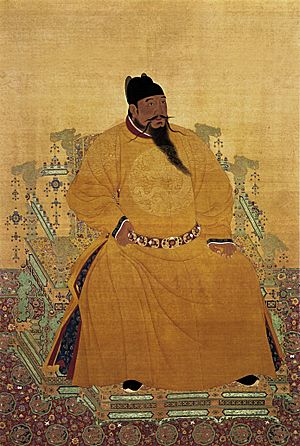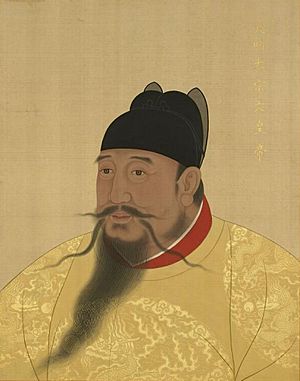Yongle Emperor facts for kids
Quick facts for kids Yongle Emperor永樂帝 |
|||||||||||||||||
|---|---|---|---|---|---|---|---|---|---|---|---|---|---|---|---|---|---|
 |
|||||||||||||||||
| 3rd Emperor of the Ming dynasty | |||||||||||||||||
| Reign | 17 July 1402 – 12 August 1424 | ||||||||||||||||
| Coronation | 17 July 1402 | ||||||||||||||||
| Predecessor | Jianwen Emperor | ||||||||||||||||
| Successor | Hongxi Emperor | ||||||||||||||||
| Born | 2 May 1360 Yingtian, (present-day Nanjing, then actually controlled by Zhu Yuanzhang's military government) Jiangzhe province, Yuan dynasty |
||||||||||||||||
| Died | 12 August 1424 (aged 64) Yumuchuan, Nurgan, Ming dynasty |
||||||||||||||||
| Burial | 19 December 1424 Changling Mausoleum, Ming tombs, Beijing |
||||||||||||||||
| Consorts |
Empress Renxiaowen
(m. 1376; died 1407) |
||||||||||||||||
| Issue | Hongxi Emperor Zhu Gaoxu Zhu Gaosui Princess Yong'an Princess Yongping Princess Ancheng Princess Xianning Princess Changning |
||||||||||||||||
|
|||||||||||||||||
| House | House of Zhu | ||||||||||||||||
| Father | Hongwu Emperor | ||||||||||||||||
| Mother | Empress Xiaocigao | ||||||||||||||||
The Yongle Emperor (born May 2, 1360, died August 12, 1424), also known as Zhu Di, was the third emperor of the Ming Dynasty in China. He ruled China from 1402 to 1424. He is famous for several big changes. He moved China's capital to Beijing, built the amazing Forbidden City, and sent Zheng He on long sea voyages. These trips explored places like Indonesia, India, Arabia, and eastern Africa.
Contents
Understanding the Yongle Emperor's Names
The Yongle Emperor's real name was Zhu Di. In Chinese writing, it looks like 朱棣. His family name was Zhu, and his given name was Di. In China, family names are usually written first. The name Di means "Japanese cherry," but in Chinese, this plant is not seen as Japanese.
How Chinese Emperors Named Their Years
In old China, emperors did not count years from a single starting point. Instead, they gave names to different "eras" or groups of years whenever they wanted. Some emperors had many eras during their rule. Zhu Di started his era the year after he took Yingtian (now Nanjing) from his nephew, the Jianwen Emperor, in 1402.
He called his new era the "Era of Eternal Happiness." This sounds like Yǒnglè in Chinese. It is written 永樂 in traditional Chinese and 永乐 in simplified Chinese. Since he only had this one era, people also called him the "Emperor of the Yongle Era" or Yǒnglèdì (永樂帝).
Titles and Respect for the Emperor
When he was alive, Chinese people simply called him "the Emperor." If they met him, they used very polite words like Bìxià (陛下, meaning "Your Highness"). After he died, later emperors gave him a long, respectful posthumous name. They also called him Míng Chéngzǔ (明成祖), which means "Most Successful Ancestor" of the Ming.
Today, after big changes in China's government, people are less formal when talking about old emperors. They often just call him by his everyday name, Zhu Di. But in English, it's more common to call him the Yongle Emperor.
The Life of Yongle Emperor
Zhu Di was born on May 2, 1360, during the Yuan Dynasty period of China's history. His father, Zhu Yuanzhang, was a strong leader of the Red Turbans. This group was fighting the Yuan army to change China.
Who Was His Mother?
There are different ideas about who Zhu Di's mother was. In official histories written by later Chinese governments, his mother was Empress Ma, his father's main wife. However, some people, especially those who disliked Zhu Di, said his mother was one of his father's other partners and not even Chinese. They claimed he changed the records about his real mother after he became powerful.
Becoming a Prince
Zhu Yuanzhang won his fight against the Yuan and became the Hongwu Emperor of China in 1368. He named his new government the Ming Dynasty. The Ming Dynasty had rules about who would become the next emperor. Zhu Biao was Zhu Yuanzhang's oldest son, and everyone expected him to be the next ruler. Zhu Di was only the fourth son, so he was not expected to become emperor.
Even so, Zhu Di was very important. The Hongwu Emperor made him the leader of Beiping (which is now Beijing and the area around it).
The Fight for the Throne
Sadly, Zhu Biao died before the Hongwu Emperor. When the emperor passed away, the Ming rules said that Zhu Biao's son, Zhu Yunwen, should be the new leader. He became the Jianwen Emperor in 1398 when he was 22 years old.
The Jianwen Emperor had many powerful uncles, almost like kings. He quickly started to take away their power. One uncle was sent away, another died, and three were made into common people. Zhu Di became afraid. He pretended to be sick or even crazy. This made the Jianwen Emperor less worried about him. He even let Zhu Di's three sons, who were being held in Yingtian (now Nanjing) to ensure Zhu Di's good behavior, go to Beiping (now Beijing) to visit their "sick" father.
Once his sons were safe, Zhu Di began to fight the Jianwen Emperor. At first, he claimed he only wanted to protect his nephew from "bad advisors" who were telling the emperor to fight his own family. But after he captured the capital, he changed all the official government papers. He made it seem as if the Jianwen Emperor had never been emperor. The four years of his nephew's rule were added to the end of the Hongwu Emperor's era. Zhu Di then started his new era at the next Chinese New Year and became the Yongle Emperor.
Moving the Capital to Beijing
Many people in China's government did not like the Yongle Emperor. They felt he should not be the country's leader. A body was shown and said to be the Jianwen Emperor's, but it was badly burned, so no one could be sure. Some people even believed the Jianwen Emperor was still alive, hiding as a Buddhist monk. All of this made the Yongle Emperor very worried and angry.
He decided not to stay in Yingtian (Nanjing) as his capital. He left some government offices there but moved most of his government to his home in Beiping. Because China now had a more important northern capital and a secondary southern capital, these two cities became known as Beijing (Northern Capital) and Nanjing (Southern Capital). The Yongle Emperor's new, larger home in Beijing grew into the famous Forbidden City. The Yongle Emperor punished many of the government leaders in Nanjing who had opposed him. Sometimes, he punished their families too.
Zheng He's Voyages
Many of the people who caused trouble were powerful because they had passed difficult government exams. The Yongle Emperor decided to give more power to his eunuchs instead. One of these men was Zheng He. Zheng He was a Muslim leader who commanded large "treasure ships." He led seven big trips south from Suzhou and Nanjing between 1405 and 1433.
The first trips might have been to search for the missing Jianwen Emperor. But they also became important journeys that taught China about the South China Sea and Indian Ocean. These voyages helped open up more buying and selling between China and other countries.
The Yongle Emperor died on August 12, 1424. His oldest son, Zhu Gaochi, became the next emperor, known as the Hongxi Emperor.
Images for kids
-
Bronze statue of the Yongle Emperor. This is a replica of the original stone statue that was destroyed during the Cultural Revolution
See also
 In Spanish: Yongle para niños
In Spanish: Yongle para niños
 | Valerie Thomas |
 | Frederick McKinley Jones |
 | George Edward Alcorn Jr. |
 | Thomas Mensah |









